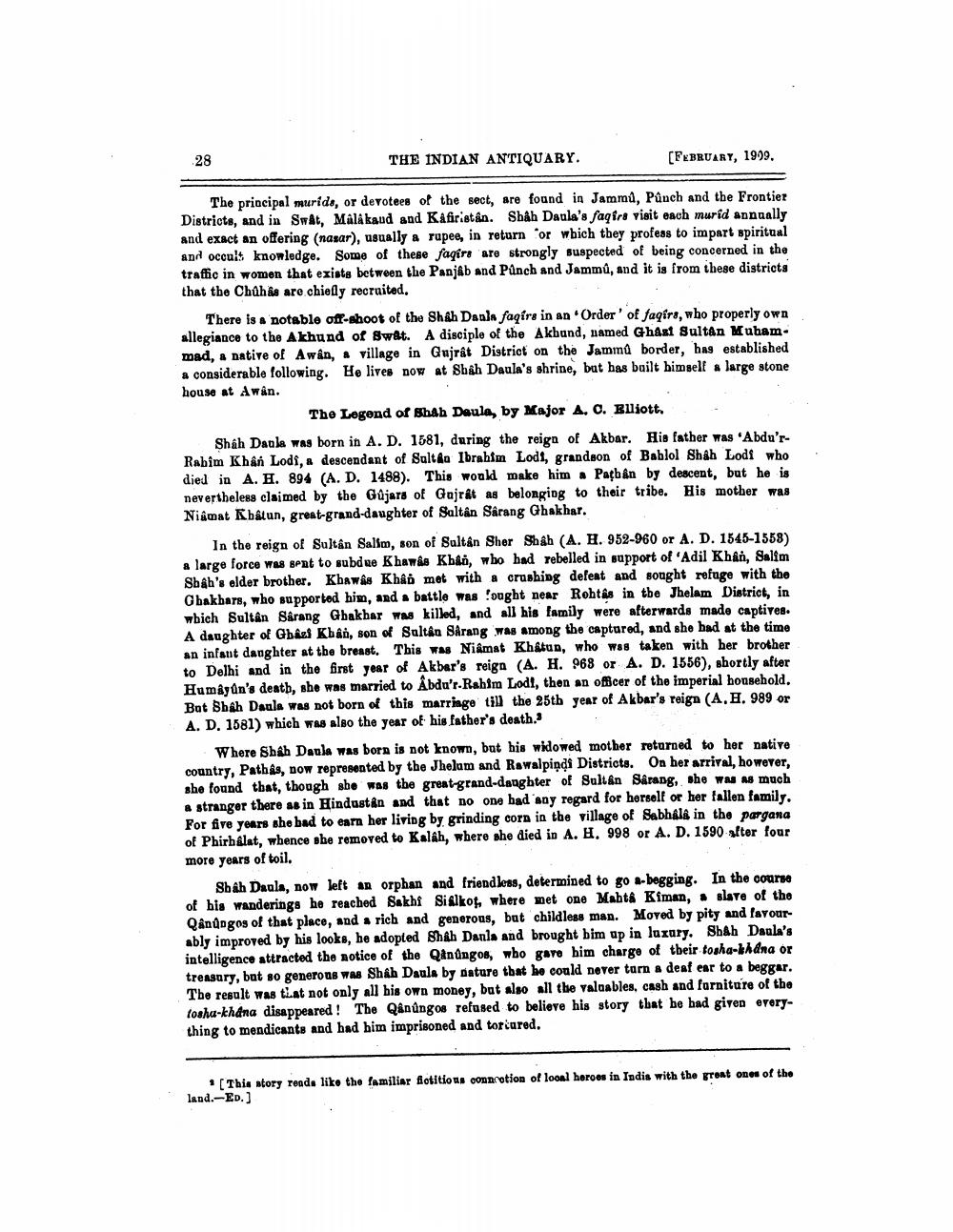________________
THE INDIAN ANTIQUARY.
(FEBRUARY, 1999.
The principal murids, or devotees of the sect, are found in Jammu, Punch and the Frontier Districts, and in Swat, Malá kaud and Kafiristân. Sbâh Daula's faqirs visit each murid annually and exact an offering (nasar), usually a rupee, in return for which they profess to impart spiritual anil occuls knowledge. Some of these faqirs are strongly suspected of being concerned in the traffic in women that exists between the Panjab and Punch and Jammů, and it is from these districts that the Chůhis are chiefly recruited,
There is a notablo off-shoot of the Shah Danla faqirs in an Order' of faqirs, who properly own allegiance to the Akhund of Sw&t. A disciple of the Akband, named Ghasi Sultan Muham. mad, a native of Awin, village in Gujrat District on the Jammg border, has established a considerable following. He lives now at Shah Daula's shrine, bat has built himself a large stone house at Awân.
The Legend of Shah Deula, by Major A. C. Elliott. Shah Daula was born in A. D. 1581, during the reign of Akbar. His father was Abdu'rRabim Khan Lodi, a descendant of Sultan Ibrahim Lodi, grandson of Bablol Shah Lodi who died in A. H. 894 (A.D. 1488). This would make him Paçban by descent, but he is nevertheless claimed by the Gdjars of Gajrát as belonging to their tribe. His mother was Niamat Kbálun, great-grand-daughter of Saltân Sarang Ghakhar.
In the reign of Sultan Salim, son of Sultan Sher Shah (A. H. 952-960 or A. D. 1545-1558) a large force was sent to subdue Khawas Khan, who had rebelled in support of 'Adil Khan, Salim Shah's elder brother. Kbawas Khâo met with a crushing defeat and sought refuge with the Obakbars, who supported him, and a battle was !ought near Rohtas in the Jhelam District, in wbich Sultan Sarang Ghakhar was killed, and all his family were afterwards made captives. A daughter of Ghazi Kbán, son of Sultan Sarang was among the captured, and she had at the time an infant danghter at the breast. This was Niâmat Khatun, who was taken with her brother to Delhi and in the first year of Akbar's reiga (A. H. 968 or A. D. 1556), shortly after Humayun's death, she was married to Abdu'r. Rahim Lodl, then an officer of the imperial household. Bot Sbih Daula was not born of this marriage till the 25th year of Akbar's reign (A, H. 989 or A. D. 1881) which was also the year of his father's death.
Where Shih Daula was born is not known, but his widowed mother returned to her native country, Pathas, now represented by the Jhelum and Rawalpindi Districts. On her arrival, however, she found that, though she was the great-grand-daughter of Sultan Sarang, she was as much a stranger there as in Hindustan and that no one had any regard for herself or her fallen family. For five years she bad to earn her living by, grinding corn in the village of Sabhálf in the Pargana of Phirbalat, whence she removed to Kalah, where she died in A. U. 998 or A. D. 1590 stor four more years of toil.
Shah Daula, now left an orphan and friendless, determined to go a-begging. In the course of his wanderings he reached Sakhi Sialkot, where met one Mahta Kiman, slave of the QAngogos of that place, and a rich and generous, but childless man. Moved by pity and layourably improved by his looks, be adopted Shah Danla and brought bim up in luxury. Shah Daula's intelligence attracted the notice of the Qanungos, who gave him charge of their tosha-khana or treasury, but so generous was Shih Daula by nature that he could never torn a deaf ear to a beggar. The result was that not only all his own money, but also all the valuables, cash and furniture of the tosha-khana disappeared! The Qanungos refused to believe his story that he had given overything to mendicants and bad him imprisoned and toriured.
. (This story reads like the familiar fictitious connotion of looal heroes in India with the great one of the land.-ED.)




